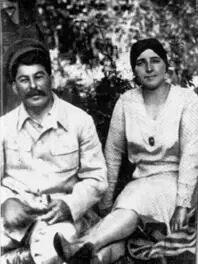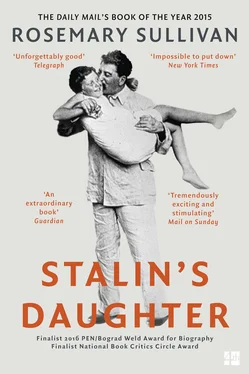When Nadya returned to the Kremlin apartment, she entered her room and closed the door. After fourteen years of marriage, she and Stalin slept separately. Her room was down a hall off to the right from the dining room. Stalin’s room was to the left of the dining room. The children’s rooms were down another hall, and much farther down that hallway came the servants’ rooms.
Sometime in the early hours of the morning, Nadya took the small Mauser pistol that her brother Pavel had given her as a gift and shot herself in the heart. 7
Nobody seems to have heard the shot—certainly not the children and none of the servants. In those days, the guard stood outside at the gate. Stalin, if he was home, seems to have slept through it all.
The housekeeper, Carolina Til, prepared Nadya’s breakfast, as she did every morning. She claimed that when she entered the room, she found Nadya lying on the floor beside her bed in a pool of blood, the little Mauser pistol still in her hand. Til ran to the nursery to wake Svetlana’s nanny, Alexandra Andreevna, and together they went back to Nadya’s room. The two women laid Nadya’s body on the bed. Rather than call Stalin, whose anticipated reaction terrified them, they phoned Nadya’s godfather, Abel Enukidze, and then Polina Molotov. The group waited. Finally Stalin woke and entered the dining room. They turned to him: “Joseph, Nadya is no longer with us.” 8
Rumors would later surface that, after the party, Stalin had gone to the Zubalovo dacha with another woman and had arrived home in the wee hours of the morning. He and Nadya quarreled, and he’d shot her. Stalin was a kind of magnet for vengeful myths, but this one is unlikely. More convincing is the relatives’ certainty that Nadya committed suicide, and they were angry: how could she abandon her children like that?
They also claimed Nadya left a bitter and accusatory suicide note for Stalin, though supposedly he destroyed it immediately upon reading it. Pavel’s wife, Zhenya, reported that for the first few days, Stalin was in a state of shock. “He said he didn’t want to go on living either. . . . [Stalin] was in such a state that they were afraid to leave him alone. He had sporadic fits of rage.” 9

Nadya and Stalin together at a picnic, from a photo taken in the early 1920s.
(Svetlana Alliluyeva private collection; courtesy of Chrese Evans)
The family needed to believe that he was devastated, and it is possible that he was. He had, in his way, loved Nadya, as his love letters to her attest. Even dictators can be sentimental. But his reaction was cruelly egocentric and focused on himself. Stalin’s sister-in-law, Maria Svanidze, recorded in her private diary the moment when she told Stalin that she blamed Nadya: “How could Nadya have left two children?” He responded, “The children have forgotten her after a few days, but I am left incapacitated for the rest of my life.” 10It is hard to imagine a father saying this of his grieving children, but Stalin’s self-pity seems convincing. Svetlana always believed, more realistically, that her mother’s suicide exacerbated Stalin’s paranoia: No one could ever be trusted; even those closest betrayed.
Why did Nadya, just thirty-one, kill herself? We will never know the truth, but speculations abound. The easiest explanation is that she was mentally ill. Initially, even Svetlana believed this. The historian Simon Sebag Montefiore writes: “[Nadya’s] medical report, preserved by Stalin in his archive, and the testimonies of those who knew her, confirm that Nadya suffered from a serious mental illness, perhaps hereditary manic depression or borderline personality disorder though her daughter called it ‘schizophrenia,’ and a disease of the skull that gave her migraines.” Nadya suffered multiple other ailments. She had had several abortions, a not uncommon form of contraception in those days, which resulted in a number of gynecological problems. 11She retreated to spas and German health resorts, an indulgence, indeed almost a fetish, of most of the Party elite.
But eventually Svetlana came to see her mother’s despair as motivated by her opposition to Stalin’s repressive policies. The question is whether there is any credibility to this idea.
Nikita Khrushchev, her fellow student at the Industrial Academy, claimed Nadya tried to assert her independence from Stalin. 12When she registered at the Academy in 1928, she retained her own name, Alliluyeva, though in truth this was not unusual among Bolshevik wives. She refused to travel to the Academy in a government car and rode the tram; this was why she had a pistol. Her brother Pavel had brought back two Mauser No. 1 pistols from a trip to England, giving one to Nadya and one to Molotov’s wife, Polina. Alexander Alliluyev, Pavel’s son, would later remark, “They took the tram to their school, and there was some real danger at that time in Moscow. Because of that, my father brought those two damned pistols from England. And in regards to this, Stalin said to my father, ‘You couldn’t find another gift?’ The gun had tiny bullets, but they were enough for Nadya to shoot herself in the heart.” 13
From her correspondence as a teenager, it is easy to see Nadya as a dogmatic, idealistic young Communist. During the Civil War that raged after the Bolsheviks’ triumph, she seemed able to rationalize the violence as necessary to the survival of the Great Revolution. When, in June 1918, Lenin sent Stalin south to Tsaritsyn (renamed Stalingrad in 1925) with 450 Red Guards to secure food supplies for Moscow and Petrograd, the seventeen-year-old Nadya and her brother Fyodor accompanied him as his assistants. A railway carriage was pulled to a siding, and Stalin used it as his headquarters. They hadn’t yet registered their marriage, but under Bolshevik convention, Nadya was already considered Stalin’s wife.
Immediately Stalin began to purge the city of suspected counterrevolutionaries. When he wrote repeatedly to Lenin demanding sweeping military powers, Nadya typed his letters. When Lenin ordered him to be ever more “ruthless” and “merciless,” Stalin replied, “Be assured that our hand will not tremble.” 14
Stalin conducted a campaign of “exemplary terror.” He burned villages to show the consequences of failure to comply with the Red Army’s orders and to demonstrate what counterrevolutionary sabotage would lead to. His enthusiasm for indiscriminate violence did not seem to faze Nadya, typing away in her railway carriage.
Nadya loved Stalin and seemed comfortable rationalizing, indeed even glamorizing, the Bolshevik cult of violence. The passionate love letters they sent each other when they were apart had an electric, if conventional, intensity. As late as June 1930, when Nadya was in Carlsbad talking a cure for debilitating headaches (another report suggests that she was actually suffering acute abdominal pains, possibly from an abortion), Stalin wrote: “Tatka [his pet Georgian name for her]. Do write to me something. . . . It is very lonely here, Tatochka. Am sitting at home, alone, like a little owl. I have not been to the country—too much work. I have finished my own task. I plan to go the day after tomorrow to the country, to the children. Well, good-bye. Do not stay there for too long, come back soon. I—kiss—you. Yours, Josef.” 15One of her letters to him ended: “I beg you to take good care of yourself. I kiss you warmly, as you had kissed me at my leaving. Yours, Nadya.” 16
But domestic life with Stalin had a different tenor and was extremely volatile. Nadya made a first attempt to leave him in 1926, when Svetlana was only six months old. After a quarrel, she packed up Svetlana, Vasili, and Svetlana’s nanny and took the train to Leningrad (as Saint Petersburg was renamed in 1924 after Lenin’s death), where she made it clear to her parents that she was leaving Stalin and intended to make her own life. He telephoned and begged her to come back. When he offered to come to get her, she replied, “I’ll come back myself. It’ll cost the state too much for you to come here.” 17
Читать дальше












![John Bruce - The Lettsomian Lectures on Diseases and Disorders of the Heart and Arteries in Middle and Advanced Life [1900-1901]](/books/749387/john-bruce-the-lettsomian-lectures-on-diseases-and-disorders-of-the-heart-and-arteries-in-middle-and-advanced-life-1900-1901-thumb.webp)
